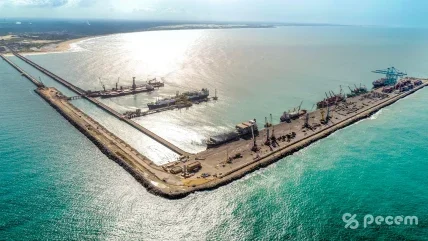
A new consortium, formed by Mitsubishi Power Americas and engineering company CONSAG, has signed an EPC (engineering, procurement, and construction) agreement with Portocem Geracao de Energia SA for the Portocem Thermoelectric Power Plant (UTE Portocem) in Brazil. The start of the project’s construction was marked with a groundbreaking ceremony on 5 May 2023.
Portocem Geracao de Energia was the biggest winner in Brazil’s first power capacity reserve auction, held in December 2021, to contract power for the National Interconnected System (SIN).
Mitsubishi Power will supply four M501JAC enhanced-air-cooled gas turbines while CONSAG will be responsible for supplying the balance of plant (BoP), utilities, civil works, assembly, and commissioning of the plant as well as provision of transmission lines and substations.
Interestingly, the four M501JAC gas turbines will operate in simple cycle.
UTE Portocem is Mitsubishi Power’s third advanced class gas turbine project in Brazil over the past six years.
Located in the Pecem Industrial and Port Complex, in the metropolitan region of Fortaleza, it will be one of the largest power plants ever built in Latin America, with an installed capacity of 1.6 GW. The project is designed to provide reliable power for the national grid in Brazil, supplying much-needed additional capacity to support existing reliance on intermittent generation provided by renewable sources.
“The UTE Portocem power plant is a historic project for Brazil, allowing an efficient energy transition and ensuring the reliability of the national electrical system”, said Eric Shigetomi, vice president of sales for South America, Mitsubishi Power Americas.
A 6 km transmission line will connect the plant to the National Interconnected System, through the Pecem 2 substation. A Floating Storage and Regasification Unit (FSRU) will be chartered by Portocem and permanently moored within the basin of the Port of Pecem.
The new LNG fuelled power plant is being designed to make power generation capacity readily available to dispatch at times when the electrical system needs extra reinforcement to meet demand peaks, according to dispatch decisions by the National System Operator (ONS).
7HA for ENEVA
Also said to be supporting “the ongoing energy transition in Brazil”, is a new HA combined cycle project announced by GE. It is the second order for GE’s H class combined cycle technology from Eneva, the largest private natural gas operator in Brazil, which is turning to GE’s HA combined cycle technology to expand the Azulao II reserve power plant.
GE notes that, with more than 75% of Brazil’s installed capacity being provided by renewables, the new 590 MW power plant will contribute to grid stability and support additional renewable energy growth.
Consisting of a 7HA.02 gas turbine, an STF-A650 steam turbine, H65 and an H53 generators, and a triple pressure reheat heat recovery steam generator, the new power plant is expected to achieve commercial operation in 2027.
Renewable power generation in Brazil is expected to grow by some 17% by 2032, from today’s 159 GW to 186 GW, an addition of 27 GW over the next ten years.
With this rise in variable renewable energy resources, aligned to Brazil’s announced long-term objective to halve carbon emissions by 2030 and reach net-zero emissions by 2050, the grid infrastructure is “expected to continue to require the stability provided by gas turbine technology”, says GE, noting that “in addition to providing reliable supply, the emissions of gas turbines can be further reduced using hydrogen fuels and carbon capture technologies in the future.”
Eneva and GE have a long-established relationship, with a number of GE 7F gas turbines having powered Eneva power plants in Maranhão, Brazil, for almost a decade. In October 2022, GE announced an order from Eneva to provide a GE 7HA.02 gas turbine for Azulão reserve power plant I, being built next to the site of the newly announced power plant. The construction of Azulão reserve power plant I began in late 2022, aiming for start of commercial operation by 2026.
“Both plants will be well-positioned to support renewable energy growth in Brazil by the end of the 2020s”, says GE.
“GE’s…H-class combined cycle plant can provide the needed flexible power to support Eneva’s isolated natural gas production operations and Brazil’s renewable-rich grid,” said Dave Ross, president & CEO, GE Gas Power in the Americas. “The new plant will help significantly reduce the carbon footprint of Eneva’s power generation portfolio as this new capacity becomes operational and coal power plants are phased out by 2040.”
The steam turbine will join one of over 85 STF-A650 units in commercial operation in 18 countries.
GE’s first H class project in Brazil was at Port de Sergipe thermal plant, where GE provided, on a turnkey basis, power generation equipment, full EPC of the gas power plant, grid construction, and associated grid interconnection systems. The Port de Sergipe plant, operated and maintained by GE, features three 7HA.02 gas turbines powering three H65 generators, an STF-D650 steam turbine powering a 60WT23E-110 generator, and triple pressure reheat HRSGs.
It achieved commercial operation in 2021, and was acquired by Eneva in 2022.






